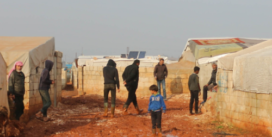- Winter Newsletter, 2025, Issue 14
- STUDENT ESSAY AND THE LIVED EXPERIENCE OF DISPLACEMENT AWARD CONTESTS
- Left out of the Levels Plan: A Call for Accessible Statistics for the Joint Assistance Sponsorship Program to Facilitate Research and Evaluation
- CARFMS2025: Canadian, Regional, and International Responses to Forced Migration
- LESSONS LEARNED FROM THE INDOCHINESE REFUGEE MOVEMENT IN CANADA IN THE 1970s AND 1980s
6th Annual Conference of the Canadian Association for Refugee and Forced Migration Studies (CARFMS)
CARFMS13: Spaces of Refuge: Exploring Practices, Perceptions and Policies in Forced Migration and (Re)Settlement
Hosted by The Department of Sociology and Criminology and The Atlantic Metropolis Centre Saint Mary’s University, Halifax, NS March 7-10, 2013
Halifax, Nova Scotia, Canada
March 7-10, 2013
The 2013 CARFMS Conference will bring together researchers, policymakers, practitioners, displaced persons, and advocates from diverse disciplinary and regional backgrounds to discuss spaces of refuge for forced migrants in the context of a changing global geopolitical context. We invite participants from a wide range of perspectives to explore the practical, experiential, policy-oriented, legal and theoretical questions raised by situations of forced migration as a result of conflict, development, climate change, and natural disaster. We also invite studies of short and long-term options for, challenges of, and success with respect to, integration, settlement, resettlement and voluntary return. In the area of both migration and settlement, we are particularly interested in studies that address threats to humanitarian space, and recommendations to counter such threats and build solidarity with those who seek refuge. Papers that consider the relevance of gender and intersectional analysis for displacement, and issues of specific relevance for refugee children and youth, are particularly encouraged. The conference will feature keynote and plenary speeches from leaders in the field and refugees, and we welcome proposals for individual posters, papers, organized panels and roundtables structured around the following broad subthemes:
1. Global/Transnational Causes and Solutions to Forced Migration
Main causes of displacement include conflict, environmental disasters and climate change, development, and frequently a combination of these. What’s more, one of the most concerning trends in the current global context is the number of long-term internally and internationally displaced persons. This suggests the usefulness of taking a global approach to understanding displacement and seeking solutions. Furthermore, the search for solutions must explore the balance between short-term emergency responses and durable solutions in the context of broader structural problems. In sum, this theme is an attempt to solicit analyses that explore causes for and solutions to displacement from global and transnational perspectives.
2. Challenges to Asylum/Resettlement and Humanitarian Space in Local Contexts
This theme seeks to analyze changing procedures and practices regarding asylum and (re)settlement more broadly. Recent changes in legislation on asylum in Canada, for example, illustrate the shrinking space for humanitarian action that characterizes the wider global context. What are the short and long-term implications of these changes in Canada and abroad? What are the responses of different social actors to such changes? What alternatives are available for humanitarian action? Another set of questions addresses how forced migrants, and the agencies assisting them, are coping with changes in perceptions, policies and practices concerning refugees, asylum seekers, and other forced migrants: Where and with whom do refugees and other forced migrants look for support? Where do displaced persons find or seek to find a sense of belonging? How are identities of forced migrants negotiated in different contexts of reception? In sum, this theme solicits exploration of the changing contexts of reception for forced migrants, and how forced migrants, agencies, and other advocates are responding to these changes.
3. Researching and Theorizing Displacement
Grounding current theories and methods of research in concrete examples of displacement will lead to a better understanding, and ultimately to better policies and practices affecting the displaced in local, regional, national, and international contexts. What are the practical issues and challenges of researching displacement? How do we do research on displacement, and how does this influence what we know? How should conventional research methods be adjusted to studies of forced migrants, who are often difficult to locate, on the move, and highly vulnerable? What role do these paradigms play in how we understand different situations of displacement, and how we respond? What are the implications of positioning ourselves as academics, policy makers, displaced persons, advocates, or activists when we are looking into issues of displacement? In sum, this theme solicits primary research into specific situations of displacement, with the goals of highlighting specificity, making comparisons, testing theory, practicing reflexivity, and examining policy appropriateness in a variety of national, and international contexts.
